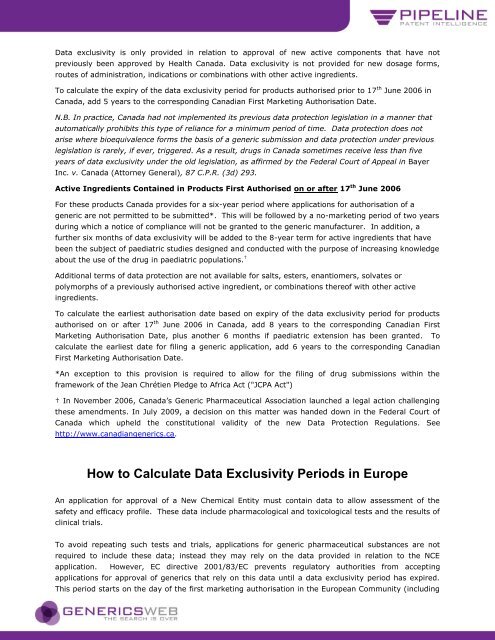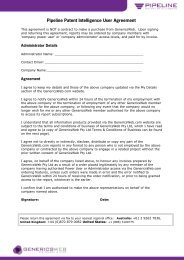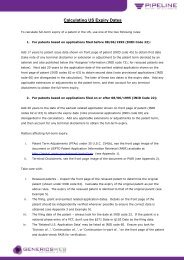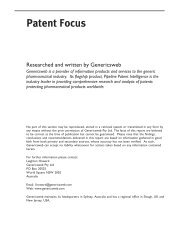How to Calculate Standard Patent Expiry Dates and ... - GenericsWeb
How to Calculate Standard Patent Expiry Dates and ... - GenericsWeb
How to Calculate Standard Patent Expiry Dates and ... - GenericsWeb
Create successful ePaper yourself
Turn your PDF publications into a flip-book with our unique Google optimized e-Paper software.
Data exclusivity is only provided in relation <strong>to</strong> approval of new active components that have not<br />
previously been approved by Health Canada. Data exclusivity is not provided for new dosage forms,<br />
routes of administration, indications or combinations with other active ingredients.<br />
To calculate the expiry of the data exclusivity period for products authorised prior <strong>to</strong> 17 th June 2006 in<br />
Canada, add 5 years <strong>to</strong> the corresponding Canadian First Marketing Authorisation Date.<br />
N.B. In practice, Canada had not implemented its previous data protection legislation in a manner that<br />
au<strong>to</strong>matically prohibits this type of reliance for a minimum period of time. Data protection does not<br />
arise where bioequivalence forms the basis of a generic submission <strong>and</strong> data protection under previous<br />
legislation is rarely, if ever, triggered. As a result, drugs in Canada sometimes receive less than five<br />
years of data exclusivity under the old legislation, as affirmed by the Federal Court of Appeal in Bayer<br />
Inc. v. Canada (At<strong>to</strong>rney General), 87 C.P.R. (3d) 293.<br />
Active Ingredients Contained in Products First Authorised on or after 17 th June 2006<br />
For these products Canada provides for a six-year period where applications for authorisation of a<br />
generic are not permitted <strong>to</strong> be submitted*. This will be followed by a no-marketing period of two years<br />
during which a notice of compliance will not be granted <strong>to</strong> the generic manufacturer. In addition, a<br />
further six months of data exclusivity will be added <strong>to</strong> the 8-year term for active ingredients that have<br />
been the subject of paediatric studies designed <strong>and</strong> conducted with the purpose of increasing knowledge<br />
about the use of the drug in paediatric populations. †<br />
Additional terms of data protection are not available for salts, esters, enantiomers, solvates or<br />
polymorphs of a previously authorised active ingredient, or combinations thereof with other active<br />
ingredients.<br />
To calculate the earliest authorisation date based on expiry of the data exclusivity period for products<br />
authorised on or after 17 th June 2006 in Canada, add 8 years <strong>to</strong> the corresponding Canadian First<br />
Marketing Authorisation Date, plus another 6 months if paediatric extension has been granted. To<br />
calculate the earliest date for filing a generic application, add 6 years <strong>to</strong> the corresponding Canadian<br />
First Marketing Authorisation Date.<br />
*An exception <strong>to</strong> this provision is required <strong>to</strong> allow for the filing of drug submissions within the<br />
framework of the Jean Chrétien Pledge <strong>to</strong> Africa Act ("JCPA Act")<br />
† In November 2006, Canada’s Generic Pharmaceutical Association launched a legal action challenging<br />
these amendments. In July 2009, a decision on this matter was h<strong>and</strong>ed down in the Federal Court of<br />
Canada which upheld the constitutional validity of the new Data Protection Regulations. See<br />
http://www.canadiangenerics.ca.<br />
<strong>How</strong> <strong>to</strong> <strong>Calculate</strong> Data Exclusivity Periods in Europe<br />
An application for approval of a New Chemical Entity must contain data <strong>to</strong> allow assessment of the<br />
safety <strong>and</strong> efficacy profile. These data include pharmacological <strong>and</strong> <strong>to</strong>xicological tests <strong>and</strong> the results of<br />
clinical trials.<br />
To avoid repeating such tests <strong>and</strong> trials, applications for generic pharmaceutical substances are not<br />
required <strong>to</strong> include these data; instead they may rely on the data provided in relation <strong>to</strong> the NCE<br />
application. <strong>How</strong>ever, EC directive 2001/83/EC prevents regula<strong>to</strong>ry authorities from accepting<br />
applications for approval of generics that rely on this data until a data exclusivity period has expired.<br />
This period starts on the day of the first marketing authorisation in the European Community (including





